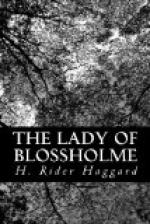Next morning they started forward early, hoping to reach Blossholme by sunset though the days were shortening much. This, however, was not to be, for as it chanced they were badly bogged in a quagmire that lay about two miles off their inn, and when at length they scrambled out had to ride many miles round to escape the swamp. So it happened that it was already well on in the afternoon when they came to that stretch of forest in which the Abbot had murdered Sir John Foterell. Following the woodland road, towards sunset they passed the mere where he had fallen. Weary as she was, Cicely looked at the spot and found it familiar.
“I know this place,” she said. “Where have I seen it? Oh, in the ill dream I had on that day I lost my father.”
“That is not wonderful,” answered Emlyn, who rode beside her carrying the child, “seeing that Thomas says it was just here they butchered him. Look, yonder lie the bones of Meg, his mare; I know them by her black mane.”
“Aye, Lady,” broke in Bolle, “and there he lies also where he fell; they buried him with never a Christian prayer,” and he pointed to a little careless mound between two willows.
“Jesus, have mercy on his soul!” said Cicely, crossing herself. “Now, if I live, I swear that I will move his bones to the chancel of Blossholme church and build a fair monument to his memory.”
This, as all visitors to the place know, she did, for that monument remains to this day, representing the old knight lying in the snow, with the arrow in his throat, between the two murderers whom he slew, while round the corner of the tomb Jeffrey Stokes gallops away.
While Cicely stared back at this desolate grave, muttering a prayer for the departed, Thomas Bolle heard something which caused him to prick his ears.
“What is it?” asked Jacob Smith, who saw the change in his face.
“Horses galloping—many horses, master,” he answered; “yes, and riders on them. Listen.”
They did so, and now they also heard the thud of horse’s hoofs and the shouts of men.
“Quick, quick,” said Bolle, “follow me. I know where we may hide,” and he led them off to a dense thicket of thorn and beech scrub which grew about two hundred yards away under a group of oaks at a place where four tracks crossed. Owing to the beech leaves, which, when the trees are young, as every gardener knows, cling to the twigs through autumn and winter, this place was very close, and hid them completely.
Scarcely had they taken up their stand there, when, in the red light of the sunset, they saw a strange sight. Along, not that road they had followed, but another, which led round the farther side of King’s Grave Mount, now seen and now hidden by the forest trees, a tall man in armour mounted on a grey horse, accompanied by another man in a leathern jerkin mounted on a black horse, galloped towards them, whilst, at a distance of not more than a hundred yards behind them, appeared a motley mob of pursuers.




